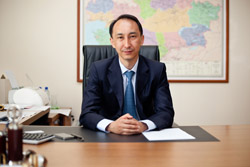June 4, 2013, at 9:00
NUR.KZ
 In an exclusive interview with Finance NUR.KZ, the Chairman of the Board of JSC Nurbank, Orynbayev Kantar Bekaralovich, discussed the latest initiatives of the National Bank, management challenges, and self-realization.
In an exclusive interview with Finance NUR.KZ, the Chairman of the Board of JSC Nurbank, Orynbayev Kantar Bekaralovich, discussed the latest initiatives of the National Bank, management challenges, and self-realization.
Dear Mr. Orynbayev, as a person with experience in the pension sector, how do you comment on the proposed reforms and related news that have long been the focus of newspapers and society?
Regarding the UAPF, I think the key issue here is the purpose we pursue by introducing it. I believe this goal should be declared. It’s vaguely mentioned—costs, profitability—but there are no clear explanations like “we are doing this to halve costs and increase profitability by this much.” I only hear bits and pieces. Any reform should have a goal so that in a few years, say five, we can say, “Indeed, costs have reduced, profitability has increased.” I have doubts about this. I think similar results could be achieved within the existing pension system. But the decision has been made, and there's probably no point in disputing it. Now it's crucial that all efforts lead to something meaningful. Essentially, we could have reduced costs and increased profitability in the old system, and now it’s crucial not to lose this in the new system. Determining the goal is paramount. A unified pension fund doesn’t imply a single manager, there can be many. Then the question arises, what will be the selection criteria? If it remains as in the old system, where contributors choose, that's great. It minimally affects contributors' interests.
So contributors decide whom to trust with their savings?
Yes, they choose their manager. If they don’t like someone, for whatever reason—it doesn't matter why—they vote with their money and move to another fund. If the system changes, for example, with tenders run by the National Bank or the Unified Pension Fund, it would be preferable for these selection criteria to be transparent. We should understand the factors in choosing or rejecting managers. Otherwise, it introduces corruption where an official might decide on the amount of billions given to a manager. Market elements should be preserved. The system had genuine market competition, which was vigorous. There was fierce competition for contributors, real market competition. Competition is always beneficial. If there are many managers and selection criteria include historical profitability, with higher profitability attracting more funds and low profitability reducing funds, then the incentive remains. Not to mention service. Funds went so far as to buy keychains, discussed by everyone: “Why did GNPF buy a million tenge worth of keychains?” This was for improving service to contributors. Will the Unified Fund engage in such activities? Will UAPF offer gifts, promotions, or lotteries to people? Unlikely. Why? This likely reduces costs. Why would funds spend on acquiring clients if everyone is in a single fund? Clients might not care. If the return is decent, they can live without the gifts. In pensions, it’s crucial to save enough.
Another idea actively promoted by the National Bank is the unification of ATMs. What do you think about this, Kantar Bekaralovich?
Regarding the EPC—Unified Processing Center—I’d prefer to see clarity and predictability from regulators and government bodies. They set our operating rules. In the pension fund situation, throughout 2012 all funds entered the stock exchange listing as required by the regulator. In 2013, it was announced a single pension fund would exist. All expenses for listing entry—fees, man-hours, and more—were wasted. Why was this necessary? It seems as if one hand was doing one thing, the other another. The same applies to the EPC. There's talk of a unified processing center, but its realization remains unclear, causing uncertainty for banks on whether they should buy ATMs or POS terminals. Investments in this sector are on hold, possibly stalling development. On the other hand, the government insists on POS terminals in retail locations. The sooner clarity is provided, the better. Be it a unified processing center or not, let it be decided swiftly. Prolonged uncertainty is detrimental to the market. Any rules can work if they are clearly defined and understandable. They should change rarely or rapidly.
The most present and hotly debated topic is raising the retirement age for women. Debates occur at all levels—from the populace to Parliament, attracting economists and political scientists alike. As a banker, surely you have a considered opinion.
 The retirement age issue should be viewed from financial and social perspectives. Financially, perhaps it’s unnecessary to discuss this in media. The Ministry of Finance, the payer, should decide. They can say based on actuarial calculations, “Yes, we can afford it” or “No, we cannot,”, or “Now we can, but by 2025, it’ll be insufficient.” We can then plan age adjustments accordingly. Or choose lower pensions instead of raising retirement age. As the payer is the state, it should be the leading force in this discussion, clearly stating, “We lack funds by this year and must act.” This is the financial aspect without emotions. High pensions have consequences. We desire high pensions and early retirement, say, at 40. But if implemented, the tax burden on us increases. The state takes from the working population to give to the retired. Tomorrow, they'll tax your son for your pension. Asking for high pensions and early retirements is misguided. Granting benefits to some means burdening others. If the stance of no increase or even decrease in retirement age prevails, and if indeed the budget lacks funds—as we don't know—taxes will rise. Where else will the state find money? People either don’t see or choose not to see this. Therefore, it's best for financially knowledgeable individuals to decide our funding capability and make a clear decision. From a social justice perspective, I don't believe men’s and women's rights should be equal. Their rights are unique. Women retiring five years earlier is a right. It’s not an issue where equality is required. It's incorrect to advocate for identical retirement ages. Men have their privileges in our society, as do women. Retiring earlier is one such privilege. Why remove it? Should we now refuse to offer seats in transportation? Let women carry heavy loads while we bake dough. Social justice allows retirement age differences, fitting our societal traditions and values. It's understandable that my female peers will retire before I do.
The retirement age issue should be viewed from financial and social perspectives. Financially, perhaps it’s unnecessary to discuss this in media. The Ministry of Finance, the payer, should decide. They can say based on actuarial calculations, “Yes, we can afford it” or “No, we cannot,”, or “Now we can, but by 2025, it’ll be insufficient.” We can then plan age adjustments accordingly. Or choose lower pensions instead of raising retirement age. As the payer is the state, it should be the leading force in this discussion, clearly stating, “We lack funds by this year and must act.” This is the financial aspect without emotions. High pensions have consequences. We desire high pensions and early retirement, say, at 40. But if implemented, the tax burden on us increases. The state takes from the working population to give to the retired. Tomorrow, they'll tax your son for your pension. Asking for high pensions and early retirements is misguided. Granting benefits to some means burdening others. If the stance of no increase or even decrease in retirement age prevails, and if indeed the budget lacks funds—as we don't know—taxes will rise. Where else will the state find money? People either don’t see or choose not to see this. Therefore, it's best for financially knowledgeable individuals to decide our funding capability and make a clear decision. From a social justice perspective, I don't believe men’s and women's rights should be equal. Their rights are unique. Women retiring five years earlier is a right. It’s not an issue where equality is required. It's incorrect to advocate for identical retirement ages. Men have their privileges in our society, as do women. Retiring earlier is one such privilege. Why remove it? Should we now refuse to offer seats in transportation? Let women carry heavy loads while we bake dough. Social justice allows retirement age differences, fitting our societal traditions and values. It's understandable that my female peers will retire before I do.
Alybek Tleuov
Finance NUR.KZ